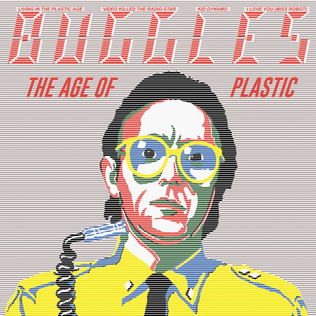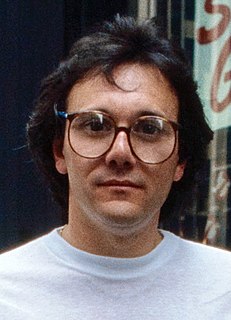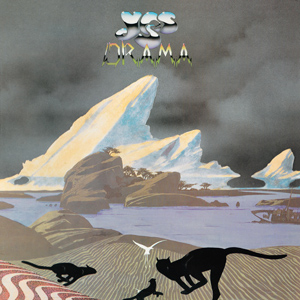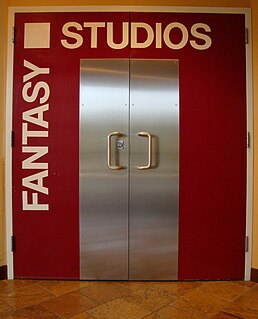Related Research Articles

The Buggles were an English new wave band formed in London in 1977 by singer and bassist Trevor Horn and keyboardist Geoff Downes. They are best known for their 1979 debut single "Video Killed the Radio Star", which topped the UK Singles Chart and reached number one in 15 other countries and was chosen as the song to launch MTV in 1981.

The Age of Plastic is the debut album by the English new wave duo the Buggles, released on 10 January 1980 on Island Records. It is a concept album about the possible repercussions of modern technology. The title was conceived from the group's intention of being a "plastic group" and the album was produced in the wake of the success of their debut record, "Video Killed the Radio Star" (1979), which topped the UK Singles Chart. Most of the album's other tracks were written during promotion of the single.

Trevor Charles Horn is an English music producer, label and recording studio owner, songwriter, singer, musician and bassist. He is best known for his production work in the 1980s, and for being one half of the new wave band The Buggles. Horn took up the bass guitar at an early age and taught himself the instrument and to sight-read music. In the 1970s, he worked as a session musician, built his own studio, and wrote and produced singles for various artists.
ZTT Records is a British record label founded in 1983 by record producer Trevor Horn, Horn's wife and businesswoman Jill Sinclair, and New Musical Express (NME) journalist Paul Morley. The label's name was also stylised as ZANG TUMB TUUM and ZANG TUUM TUMB on various releases.

A recording studio is a specialized facility for sound recording, mixing, and audio production of instrumental or vocal musical performances, spoken words, and other sounds. They range in size from a small in-home project studio large enough to record a single singer-guitarist, to a large building with space for a full orchestra of 100 or more musicians. Ideally, both the recording and monitoring spaces are specially designed by an acoustician or audio engineer to achieve optimum acoustic properties.
Solid State Logic (SSL) is a British company based in Begbroke, Oxfordshire, England that designs and markets audio mixing consoles, signal processors, and other audio technologies for the post-production, video production, broadcast, sound reinforcement and music recording industries. SSL employs over 160 people worldwide and has regional offices in Los Angeles, Milan, New York, Paris, and Tokyo, with additional support provided by an international network of distributors. Solid State Logic is part of the Audiotonix Group.

The Hit Factory is a recording studio in New York City owned and operated by Troy Germano.
Gary Michael Langan is an English engineer, record producer, mixer and musician.

Drama is the tenth studio album by the English progressive rock band Yes, released on 18 August 1980 by Atlantic Records. It is their first album to feature Trevor Horn on lead vocals and Geoff Downes on keyboards. This followed the departures of Jon Anderson and Rick Wakeman after numerous attempts to record a new album in Paris and London had failed. Drama was recorded hurriedly with Horn and Downes, as a tour had already been booked before the change in personnel. The album marked a development in the band's musical direction with more accessible and aggressive songs, and featuring the use of modern keyboards, overdriven guitar, and a vocoder.

Big Generator is the twelfth studio album by English progressive rock band Yes, released on 21 September 1987 by Atco Records. After touring in support of their previous album, 90125 (1983), which saw the band move from progressive rock towards a pop-oriented and commercially accessible direction, Yes started work on a follow-up in 1985 with producer Trevor Horn. It was a laborious album to make; recording began at Carimate, Italy, but internal and creative differences resulted in production to resume in London, where Horn ended his time with the band due to continuing problems. The album was completed in Los Angeles in 1987 by Trevor Rabin and producer Paul DeVilliers.

Sarm West Studios was a recording studio in a former 17th century chapel at 8-10 Basing Street, in Notting Hill, London, England. Originally established in 1969 as Island Studios by Chris Blackwell, the founder of Island Records, the studio was also known as Basing Street Studios until 1982, when it was acquired by SARM studio owners Jill Sinclair and her husband, producer Trevor Horn, and renamed Sarm West.

Perfect Songs is an independent music publishing company with a catalogue containing many memorable songs of the past 25 years.
Atlantic Studios was the recording studio of Atlantic Records. Although this recording studio was located at 1841 Broadway, in New York City, Atlantic Recording Studios was initially located at 234 West 56th Street from November 1947 until mid-1956. When the Shorty Rogers and His Giants disc of 33.33 rpm called Martians Come Back! was issued in August 1956, the address of Atlantic Recording Studios had relocated to 157 W 57th Street. The studio was the first to record in stereo due to the efforts of Tom Dowd.

Fantasy Studios was a music recording studio in Berkeley, California, at the Zaentz Media Center, known for its recording of award-winning albums including Journey's Escape and Green Day's Dookie. Built as a private recording studio for artists on the Fantasy Records label in 1971, it was opened to the public in 1980 for recording, mixing and mastering. It was permanently closed on September 15, 2018.

The Trevor Horn Band are an English group formed in 2006 as The Producers, when they included record producers Trevor Horn and Steve Lipson (guitar), and musicians Lol Creme and Ash Soan (drums). The band briefly adopted the name US before changing to Producers. Latterly, they have switched to the name The Trevor Horn Band.
Stuart Robert Bruce is an English recording engineer. He was the engineer for the recording of the Band Aid's charity single "Do They Know It's Christmas?" on 25 November 1984. He was born in Northolt, Middlesex.
Bradley Spence is a British record producer and mixing engineer based at Dean Street Studios, in London.

Andrew John Richards is a British-Australian pianist, composer, music producer and keyboardist.
Jill Sinclair was an English businesswoman and former record company director, a founder of ZTT Records and one of the most influential women in pop music. She has been called "One of the most successful people in the British music business".
The Solid State Logic SL 4000 is a series of large-format analogue mixing consoles designed and manufactured by Solid State Logic (SSL) from 1976 to 2002. 4000 Series consoles were widely adopted by major commercial recording studios in the 1980s.
References
- 1 2 "Our History". SARM Music Village. Retrieved 9 October 2019.
- 1 2 Massey, Howard (2015). The Great British Recording Studios. Milwaukee, Wisconsin, US: Hal Leonard Books. ISBN 978-1-4584-2197-5 . Retrieved 23 November 2021.
- ↑ John Sinclair discography at Discogs
- ↑ Bennett, John G (2009). A Journey Through Whitechapel and Spitalfields (PDF). Nottingham: Five Leaves Publications. p. 45. ISBN 978-1905512546. Archived from the original (PDF) on 20 December 2014. Retrieved 28 November 2014.
- ↑ "Mercury Paradise Audio Files". Mercuryparadise.com.
- ↑ Sefton, Jamie (20 October 2014). "Trevor Horn talks Frankie, SARM and synths". Musicradar.com. Retrieved 28 November 2014.